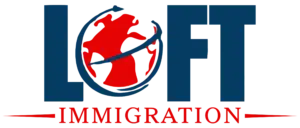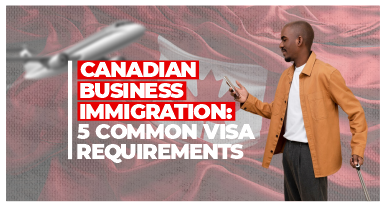What’s the best time to start your business immigration journey? 🤔 Today, we will delve into this question in detail. Many of our potential clients ask this question, when should I take my first step? And I will be very honest with you. There’s always a great time to start immigrating to Canada, but before I delve into this question in detail, here’s something to consider; at what point does a business owner realizes that it high time to get relocated to Canada?
After helping several clients start and successfully complete their Canadian business immigration process; here are a few of the situations we have seen; A situation where a foreign entrepreneur hears about Canada quite recently because he’s been doing business in other parts of the world, maybe Africa, Asia, maybe Middle East or Eastern Europe, and he wants to do business here in Canada, so he has a new desire and he’s at that threshold where he needs to know more and is it the right time or not?
Another situation that we commonly deal with is a foreign business owner has grown his or her business in their home country, they’re very aware about the world markets, very sophisticated businesses, and they’ve been doing businesses in many countries but they’re not doing business in Canada and Canada became very popular on their radar now and it seems to be a good next destination, sort of bringing their business to the next level in a way.
The most common question that we receive – when is the best time like in terms of seasons or in terms of time of the year to start your Canadian business immigration journey? I would say there’s no seasonality in Canadian business immigration, but there are certain points in time during the year that you need to be more aware of.
November 1st announcements is usually a kairos moment you want to take note of. It’s the first week of November, November 1st, the Ministry of Immigration usually announce the plans for the next one to three years. So you can be sure they will give you a big picture how many immigrants will be accepted, permanent residents and what category and so on.
Second is beginning of the year and end of the year. The commencement of the year and its closure mark significant periods for immigration considerations. Following the New Year’s holidays, activities tend to pick up noticeably. Internally, there are instances where Canada expedites certain processes or introduces changes. Therefore, as the year draws to a close, it is prudent to anticipate adjustments.
Vigilance is key during this period, it’s important to stay informed. Join our next webinar so you don’t miss out on such Kairos moment. Although the year’s initiation may seem gradual, the momentum of permanent residency applications becomes quite dynamic. Motivated by New Year’s resolutions, individuals are enthusiastic about progressing with their immigration plans. Both the beginning and end of the year warrant constant monitoring, as the Canadian government is generally proactive in providing advance notice of program changes, pauses, revivals, and other pertinent updates.
An illustrative case is the potential revival of the Quebec investor program, likely in 2024. While the government typically provides advance notice of impending changes, this is not always guaranteed. Sporadic alterations are not uncommon, introducing an element of unpredictability. If you want to know the best pathways to Canada Immigration; we made a special post on that; click here to learn more.
Going forward, the lack of consistency in these matters implies a need for adaptability. Despite this, in many instances, there is a period during which individuals can adjust to new realities. Governments commonly issue warnings before implementing changes, offering a degree of predictability within the dynamic field of immigration.
Examining timing from both the immigration and applicant perspectives, it becomes a highly personal consideration. Consider the scenario of self-employed entrepreneurs or professionals who must organize their affairs in their home countries. This involves tasks such as selling businesses, completing necessary paperwork, and fulfilling commitments before progressing with immigration plans.
For optimal timing, a suggested timeframe is at least six months to organize affairs in the home country. Entrepreneurs worldwide, may face unforeseeable challenges. Factors beyond their control, such as currency devaluation or political upheavals, can significantly impact their circumstances, hence the need for adequate preparation.
The volatility extends beyond home countries to potential changes in Canadian laws and regulations. Staying informed about Canadian updates is crucial, but internal regulations in your home country may also shift, requiring timely adjustments. To avoid a reactive approach, it is advisable to plan ahead with the assistance of licensed and authorized Canadian immigration consultants like us, so we can provide a more predictable plan for your journey.
Recognizing business immigration as an ongoing journey, rather than a one-time event, is essential. This perspective emphasizes the importance of continuous, incremental steps. Traveling to other countries can be a valuable aspect of this journey, offering new business insights and expanding perspectives. Improving your travel history can enhance your opportunities and preparedness for Canadian temporary visas.
Ensuring a timely and well-prepared start to your business immigration journey is closely tied to financial liquidity. It’s not uncommon for business owners to possess substantial assets globally or in their home countries, yet lack the necessary cash flow. This underscores the importance of strategic timing. When you find yourself in a position of financial liquidity, the feasibility of progressing becomes more grounded.
Many entrepreneurs face the challenge of having significant assets but insufficient ready cash. Adequate preparation, therefore, involves aligning your immigration plans with periods of financial liquidity. This proactive approach safeguards against finding yourself midway in a situation where investment or fund transfer to a Canadian business is required without the requisite liquidity.
Having ready cash for immigration is crucial, as business immigration typically involves a certain level of financial investment. To meet this requirement, you might explore options such as selling assets you no longer need or leveraging loans or credit against existing assets. However, it’s important to note that demonstrating the source and history of funds is a pivotal aspect of the immigration process.
Questions regarding the origin of funds are routine, and sudden increases in your bank account may raise suspicions. Transparency is key, and during the business immigration process, you will need to explain the source of funds. Having a clear and documented history of liquid funds for at least 4 to 6 months is preferable.
This approach ensures a smooth process, and it is generally well-received. Beyond financial aspects, a running business in your home country, engaged in legitimate sales and services, further strengthens your immigration application. Particularly for intra-company transfers, a demonstrable history of business activities adds credibility to your application. In essence, a holistic approach to business immigration includes strategic timing aligned with financial readiness and a transparent history of funds.
Another critical aspect to prioritize is document preparation, a common challenge faced by business owners of various ages. Many individuals, having graduated from schools or universities long ago, may lack readily available educational documents and work-related records showcasing their experience and qualifications.
Ensuring the retrieval of these documents in advance is essential. Instances where universities no longer exist or have undergone changes necessitate careful legwork to obtain necessary transcripts or diplomas. Whether it’s proving qualifications or experience relevant to your business goals in Canada, having these documents on hand is invaluable.
Equally important is obtaining language test results. If pursuing permanent residency and demonstrating language proficiency for business interactions in English or French-speaking communities, language skills become crucial. Acquiring results from language tests like IELTS for English or TEF for French requires time and preparation, regardless of citizenship.
Certain challenges arise in proving work experience, where documents like workbooks or logbooks play a pivotal role. Reference letters, whether from clients or previous employers, further strengthen and minimize risks during your application.
A common pitfall encountered is the desire for immediate results, especially in a month. However, adopting a gradual, preparatory approach is advised. Consistent progress, even in small steps, proves to be more successful over time.
It’s essential to dispel fears of sudden changes in Canadian immigration programs. The country has consistently remained open to immigrants, emphasizing the importance of starting your immigration journey when you are psychologically, financially, and document-wise prepared. The best time to initiate your business immigration is a deeply personal consideration, hinging on your readiness across various aspects.
The constancy of genuine business people, their agility, and adaptability remain unwavering. Rather than being swayed by doubts, focus on your objectives. Take proactive steps to prepare your business and yourself for the journey ahead. While global crises may surround us, they need not hinder your progress or your aspirations for a future in Canada.
Receiving solid advice and staying informed about legislative changes is crucial. Although some aspects may seem relatively constant in both Canada and your home country, acknowledging the potential for change is paramount. The ability to adapt, pivot, and adjust immigration plans accordingly is key.
Should you have questions or seek honest advice on Canadian business immigration, we are here to assist. With over a decade of experience, you can trust us with your Canadian business immigration dream. Our primary mode of communication is through social media, feel free to send us a message on Whatsapp, Instagram, Facebook etc. or send us an email. Want to learn more about Canadian business immigration; your questions are welcome:
FREQUENTLY ASKED QUESTION
1. When is the best time to start my business immigration journey to Canada?
The ideal time can vary, but being aware of key moments like November 1st announcements and the beginning or end of the year can be advantageous.
2. Are there specific seasons for Canadian business immigration?
While there isn’t a set season, being vigilant during certain periods, like the start and end of the year, is essenti
3. How does financial liquidity play a role in business immigration?
Financial liquidity is crucial for a smooth business immigration process. The blog explains the importance of being financially ready and strategic in your timing.
4. What if my home country’s internal regulations change during the immigration process?
Adapting to changes is part of the process. Planning ahead and staying informed with the help of licensed immigration consultants can minimize the impact of such changes.
5. Can I start my Canadian business immigration journey without a significant travel history?
Yes, although having a solid travel history can enhance your visa applications. Traveling to other countries can help you gain new business insights and improve your overall preparedness.
6. Why is transparency about the source and history of funds crucial during immigration?
Transparency is key to explaining the origin of funds. A clear and documented history of liquid funds for at least 4 to 6 months is preferable to immigration authorities.
7. Is it possible to sell assets or leverage loans for financial readiness?
Yes, selling assets or leveraging loans against existing assets are viable options to ensure financial readiness for business immigration.
8. How can I prove my work experience during the immigration process?
Proving work experience may involve documents like workbooks, logbooks, and reference letters from clients or previous employers. These strengthen your application and minimize risks.
9. Why is an incremental and preparatory approach advised over seeking immediate results?
A gradual, preparatory approach is recommended for better success. Consistent progress, even in small steps, proves more effective than rushing to find immediate solutions.
10. Are there any guarantees about the permanence of Canadian business immigration programs?
While no guarantees exist, Canada has historically remained open to immigrants. Focusing on your progress and being prepared is more important than fearing sudden changes.
11. How can I stay updated on Canadian immigration changes and announcements?
Regularly monitoring announcements, joining our webinars, and staying informed through reliable sources are crucial for keeping up with Canadian immigration changes.
12. Can I start my business immigration journey without a comprehensive understanding of Canadian laws?
While a deep understanding of Canadian laws is beneficial, working with licensed immigration consultants like us helps provide a more predictable plan and navigate legal complexities effectively.







